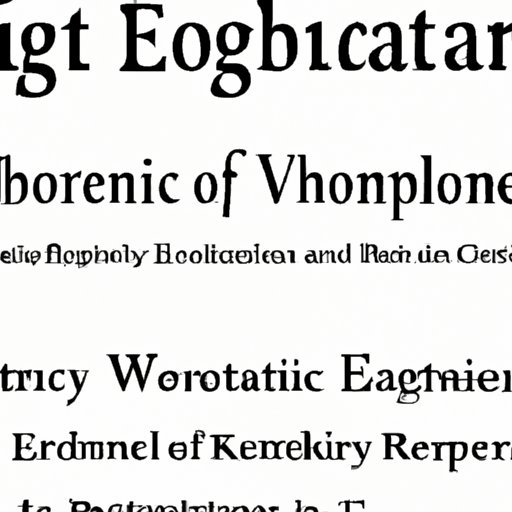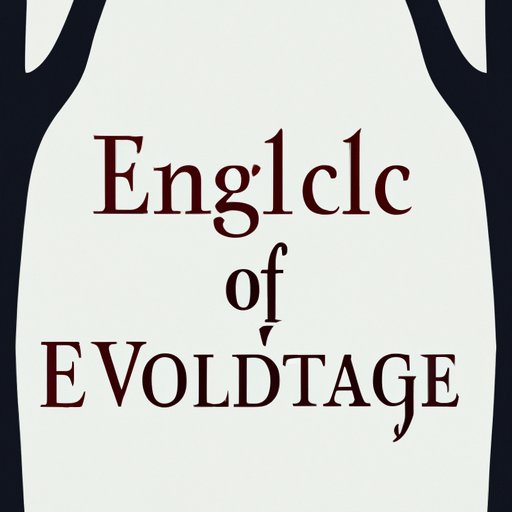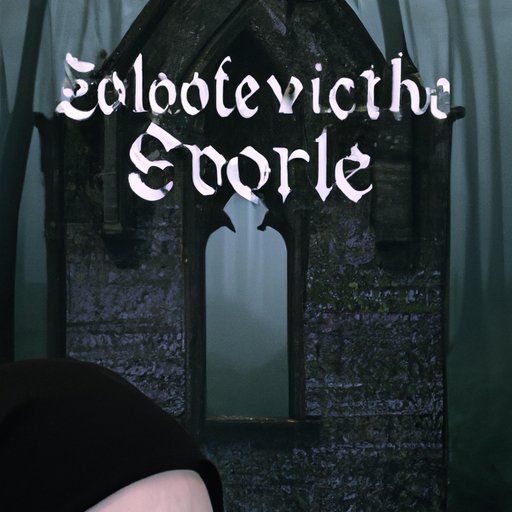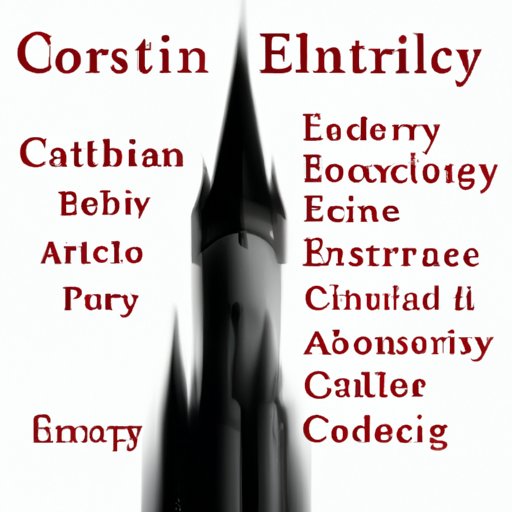Introduction
Gothic literature is a genre of fiction that emerged in the late 18th century, often featuring dark and mysterious themes, as well as elements of horror and romance. Gothic literature has had a lasting impact on culture, literature, and even film, and is still popular today. In this article, we will explore why Gothic literature is important, from its cultural impact to its representation of social issues and its influence on modern horror genres.

Examining the Cultural Impact of Gothic Literature
Gothic literature was incredibly popular in its time, both in terms of readership and literary criticism. According to literary scholar Robert Miles, “the gothic novel…was the most successful genre of the late eighteenth century” 1. This popularity was due in part to the fact that the genre addressed many of the anxieties and fears of the era, such as religious doubt, scientific advances, and political unrest. As such, Gothic literature was an effective way for authors to explore and express these issues without directly addressing them. Gothic literature also served as an outlet for readers to explore the darker sides of their own psyches and the world around them.
The influence of Gothic literature can still be seen in modern culture. For example, the works of Edgar Allan Poe are still widely read and have been adapted into films, television shows, and other forms of media. Similarly, the works of Mary Shelley, Bram Stoker, and other writers of the Gothic era have had a lasting impact on literature and popular culture. The themes and tropes of Gothic literature, such as fear and suspense, can be seen in many modern horror films and books.
Exploring the Representation of Social Issues in Gothic Writing
In addition to exploring the darker side of human nature, Gothic literature has often been used as a vehicle for addressing social issues. For example, early Gothic novels like Mary Shelley’s Frankenstein and Bram Stoker’s Dracula were used to explore issues of racism and xenophobia. Similarly, Jane Austen’s Northanger Abbey satirized the conventions of the Gothic genre while also challenging the class system of its time. More recently, authors like Toni Morrison and Angela Carter have used the Gothic genre to explore issues of sexism and oppression.
The use of Gothic writing to address social issues is significant because it allows authors to explore difficult topics without directly confronting them. By using elements of horror, mystery, and suspense, authors can create stories that are both entertaining and thought-provoking. Furthermore, the use of Gothic literature to address social issues helps to raise awareness and encourage dialogue about important topics.

Investigating the Influence of Gothic Literature on Modern Horror Genres
Gothic literature has had a profound influence on modern horror genres. Many of the tropes and conventions of Gothic literature, such as haunted houses, mysterious creatures, and supernatural forces, can be seen in modern horror films and books. For example, the 1979 film Alien draws heavily from Gothic literature, with its eerie setting, mysterious creature, and suspenseful plot. Similarly, Stephen King’s novel The Shining is heavily influenced by Gothic literature, with its haunting atmosphere, creepy characters, and dark themes.
The influence of Gothic literature on modern horror genres is significant because it allows authors and filmmakers to explore themes of fear, suspense, and the unknown in new and creative ways. Furthermore, by drawing on the conventions of Gothic literature, authors and filmmakers are able to create stories that are both entertaining and thought-provoking.
Analyzing the Role of Gothic Literature in Subverting Traditional Gender Roles
Gothic literature has often been used to challenge traditional gender roles and expectations. For example, the female protagonists in many Gothic novels are strong, independent women who defy societal norms and refuse to be constrained by gender roles. Similarly, many male characters in Gothic literature are portrayed as flawed and vulnerable, which serves to challenge traditional ideas of masculinity. By subverting traditional gender roles, Gothic literature allows authors to explore complex issues of gender and power in an engaging and thought-provoking way.
The significance of Gothic literature in challenging traditional gender roles cannot be overstated. By presenting characters who defy gender stereotypes, Gothic literature encourages readers to think critically about gender roles and expectations. Furthermore, by allowing authors to explore gender issues in an entertaining and engaging way, Gothic literature can help to foster discussion and dialogue about these important topics.

Looking at How Gothic Literature Serves as a Form of Escapism
Finally, Gothic literature can serve as an effective form of escapism for readers. By immersing themselves in a world of suspense, mystery, and horror, readers can temporarily escape from their everyday lives and experience something thrilling and exciting. This can be especially beneficial for those who are struggling with difficult emotions or situations, as it allows them to explore their feelings in a safe and controlled environment. Furthermore, reading Gothic literature can provide readers with a sense of comfort and familiarity, as the genre often features similar themes and characters.
The ability of Gothic literature to provide readers with an escape from reality is significant. It allows readers to explore their emotions in a safe and controlled environment, and it can also provide them with a sense of comfort and familiarity. Furthermore, by immersing themselves in a world of suspense and mystery, readers can temporarily forget their troubles and experience something thrilling and exciting.
Conclusion
In conclusion, Gothic literature is an important genre of literature that has had a lasting impact on culture, literature, and film. From its cultural impact to its representation of social issues and its influence on modern horror genres, Gothic literature has been used to explore difficult topics in an entertaining and engaging way. Additionally, Gothic literature has challenged traditional gender roles and provided readers with an escape from reality. All of these factors make Gothic literature an important and relevant genre of literature.
(Note: Is this article not meeting your expectations? Do you have knowledge or insights to share? Unlock new opportunities and expand your reach by joining our authors team. Click Registration to join us and share your expertise with our readers.)
